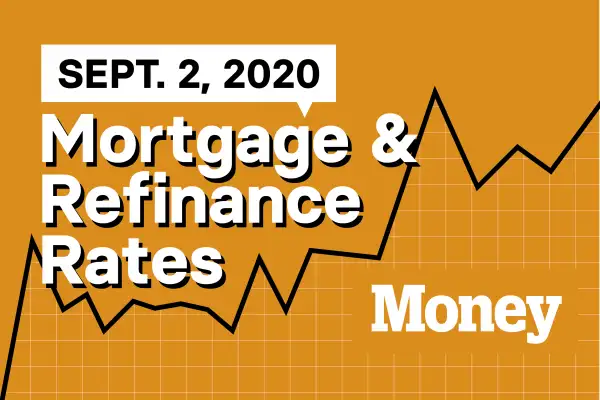Here Are Today's Best Mortgage & Refinance Rates for September 2, 2020

Borrowers with 700 credit scores were quoted an average rate of 3.356% to secure a 30-year fixed-rate purchase mortgage on Tuesday, according to Money's survey of over 8,000 lenders across the United States. At this credit score, roughly the national average, the average rate for a 30-year refinance was 4.206%. Our rates include discount points and are for borrowers putting 20% down.
| 30-year fixed-rate purchase mortgage |
| 3.356% |
| Rates of September 1, 2020 |
Borrowers in Illinois were quoted the lowest mortgage rates on Tuesday—at a rate of 3.231%. Those in New Mexico saw the highest average at 3.554%. Nationwide, borrowers with the highest credit scores, 740 and above, were quoted rates averaging 3.081%, while those with credit of 640 or below were given rates of 4.876%—a 1.795 percentage point spread.
You may be able to negotiate a lower rate if you shop around or if you have other accounts with the lender. (Check out Money's picks for the best mortgage lenders here.) Currently, some banks are hiking up advertised rates to keep demand in check, so you may be offered a lower rate if you reach out directly.
Freddie Mac’s widely quoted Primary Mortgage Market Survey put rates at 2.91% with 0.8 discount points paid for the week ending August 27. The mortgage purchaser’s weekly survey reflects borrowers who put 20% down on conforming loans and have excellent credit.
Refinance rates today
Money's survey shows that the best rate for a 30-year refinance for someone with a 740 credit score was 3.48% on Tuesday. Last September, the average mortgage rate (including fees) was 3.922%.
| 30-year fixed-rate mortgage refinance |
| 3.48% |
| Rates of September 1, 2020 |
A homeowner with a $200,000 mortgage balance currently paying 3.922% on a 30-year loan could potentially cut their monthly payment from $946 to $896 by financing at today’s lower rates. To determine if it is worth it to refinance your mortgage, also consider the closing fees you paid on your current mortgage, how much your new lender is charging and how long you have left on your current mortgage. (Our picks for the best lenders for refinancing are here.)
What else is happening in the housing market right now?
The news of today, that could impact your home tomorrow.
Mortgage loan applications were down for the week ending August 28, according to the Mortgage Bankers Association's Weekly Mortgage Applications Survey. The overall volume of loan applications was down 2% week-over-week.
Purchase loans were down a seasonally adjusted 0.2% from the previous week but were still 28% higher than the same week last year, marking the 15th consecutive week of year-over-year gains. Refinance loans, which have been in high demand for months, were down 3% week-over-week, though still 40% higher than the same week last year. Refinance loans made up 62.5% of all mortgage loan applications.
"Mortgage rates have remained below 3.5% for five months now, and it's possible that refinance demand may be slowing and will not significantly increase again without another notable drop in rates," said Joel Kan, the MBA's associate vice president of economic and industry forecasting. "Lenders are reporting that the strong demand for homebuying is coming from delayed activity from the spring, as well as households seeking more space in less densely populated areas."
On Tuesday, the Health and Human Services and the Center for Disease Control and Prevention issued an Agency order that temporarily halts residential evictions through December 31. The move, while providing relief from renters facing economic distress from the COVID-19 pandemic, places strain on landlords that depend on rental income.
Widespread industry reaction is calling for some sort of rental assistance for property owners to help defray the loss of income. In the absence of such assistance, they say, the moratorium could severely impact the ability of property owners and landlords to meet their own mortgage and payroll obligations.
The following statement was issued by Vince Malta, president of the National Association of Realtors, and is echoed by other industry leaders:
“While NAR appreciates and is supportive of administration efforts to ensure struggling Americans can remain in their homes, this order as-written will bring chaos to our nation’s critical rental housing sector and put countless property owners out of business."
“Any eviction moratorium must also come with rental assistance for property owners, the vast majority of which are mom-and-pop investors and are still required to meet their financial obligations even as they cease to receive income on their properties.
“An untailored eviction moratorium will bring more havoc to our economy, not less, and will put America’s 43 million renter households at significant risk. NAR strongly encourages Congress to pass immediate legislation that would instead provide emergency rental assistance programs directly to housing providers, protecting Americans’ access to affordable housing and our nation’s critical rental housing sector.”
Quote of the Week
If a property was marketed for $400,000, but there were 10 buyers competing for the property, and somebody’s paying $420,000, what’s market value?” asks Jefferson L. Sherman, president of the Appraisal Institute. “That’s the tough question that appraisers have. Does that represent market value? Well, it may or may not.”
For more read: Bidding Wars Are Back. Here's How to Win Your Dream Home
Bottom line:
5 Ways Your Finances Instantly Change When You Buy a House
When Will It Get Easier to Buy a Home? 8 Experts on the Nation's Housing Shortage
